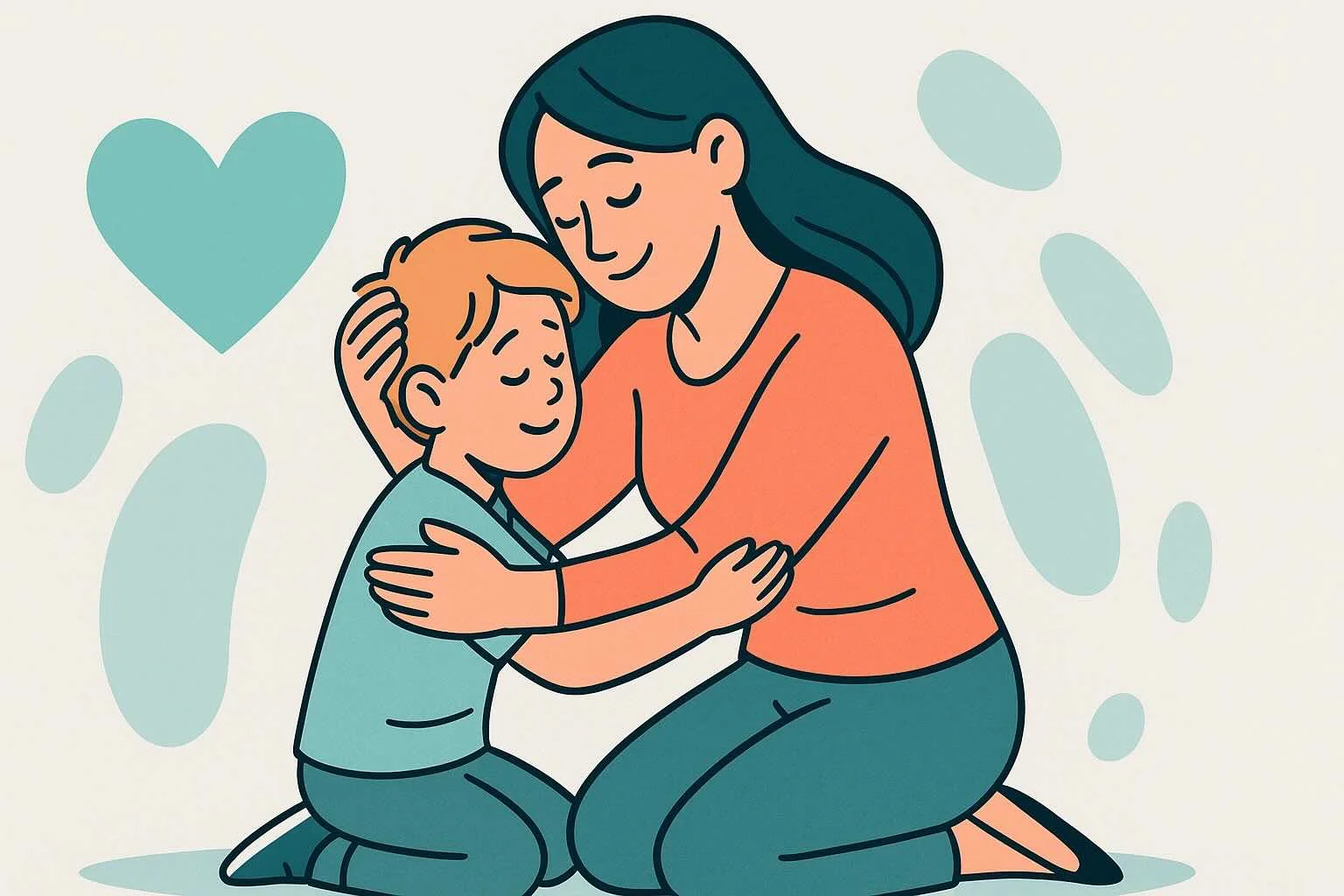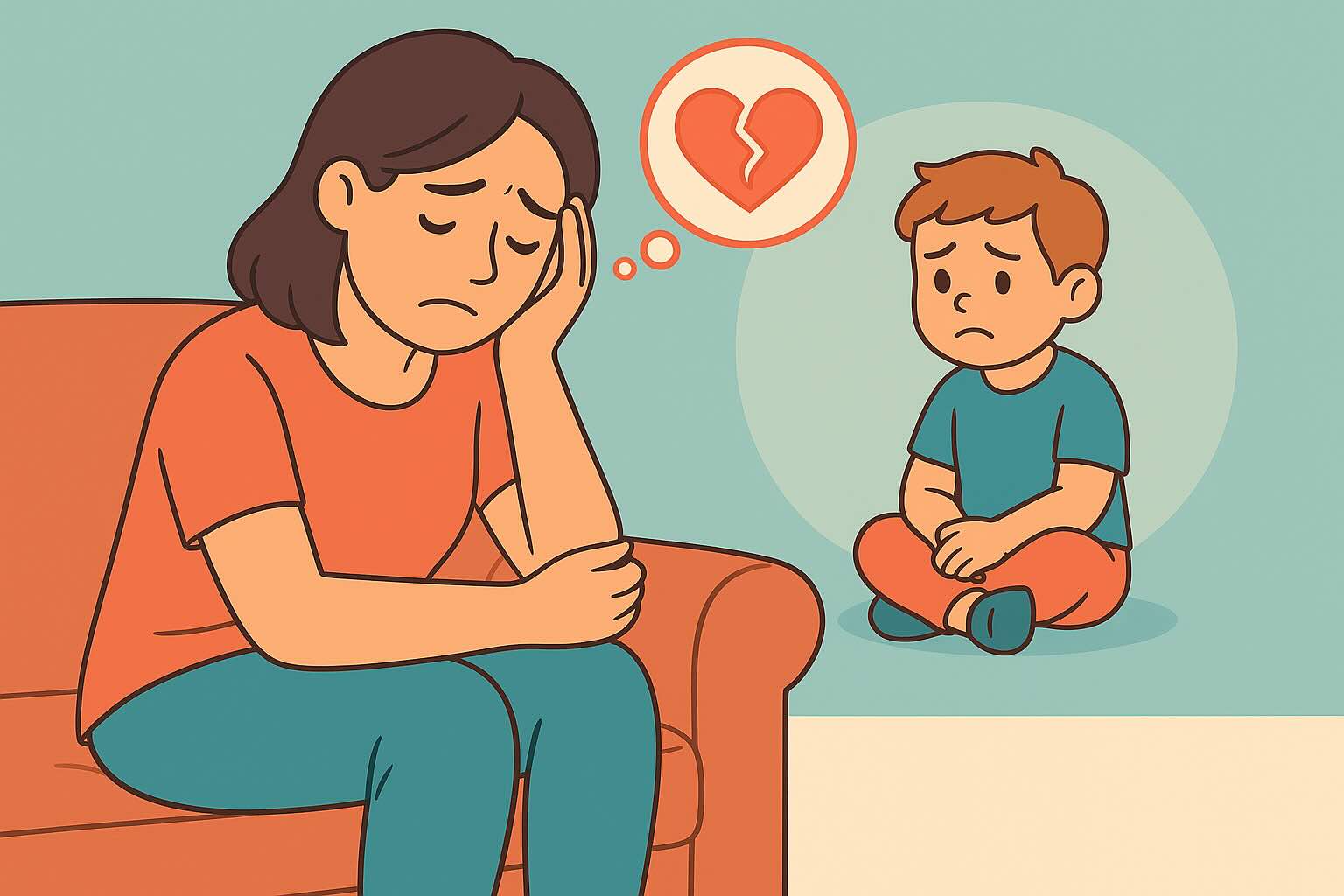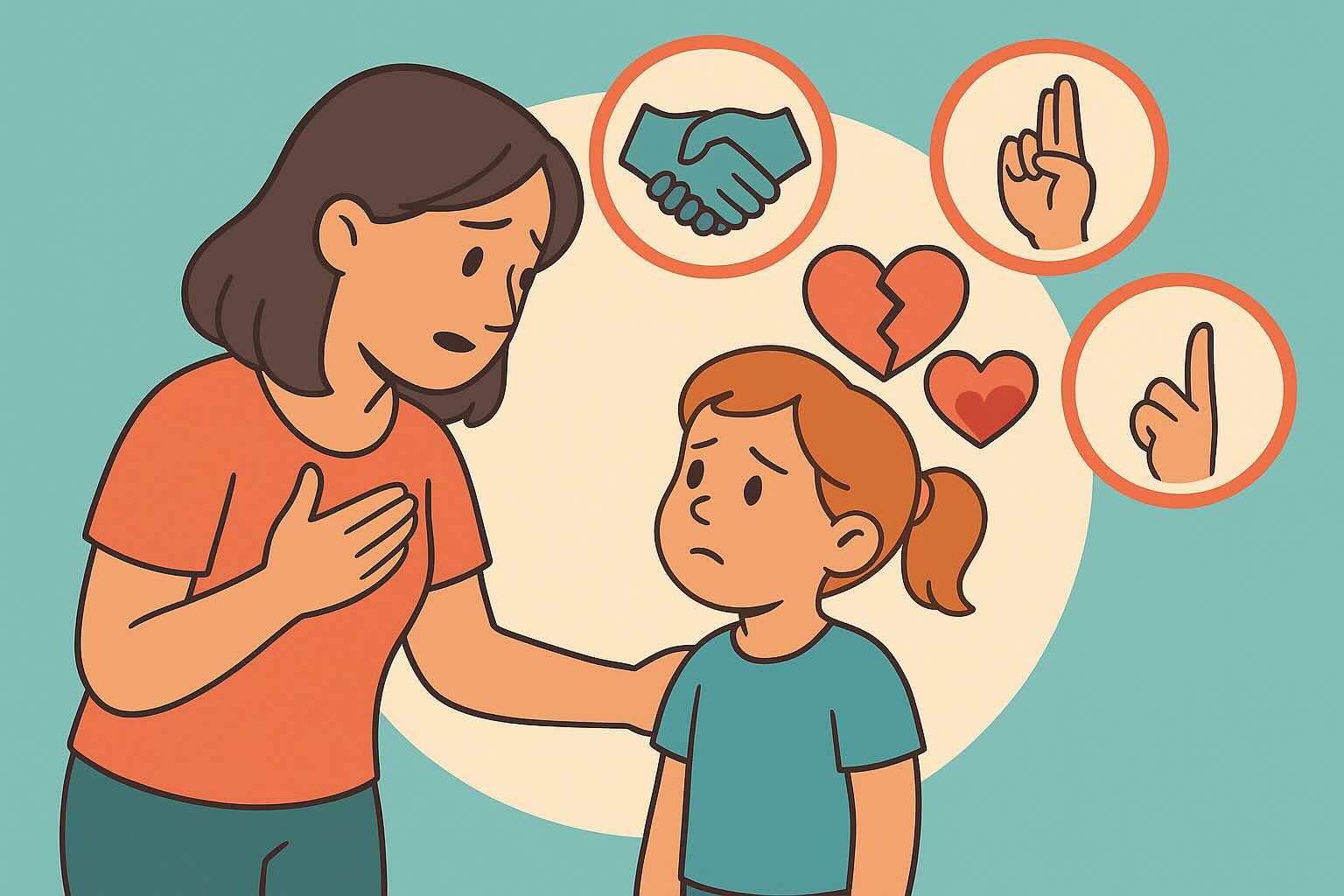How to Repair After Losing Your Cool: 5 Scripts That Rebuild Trust

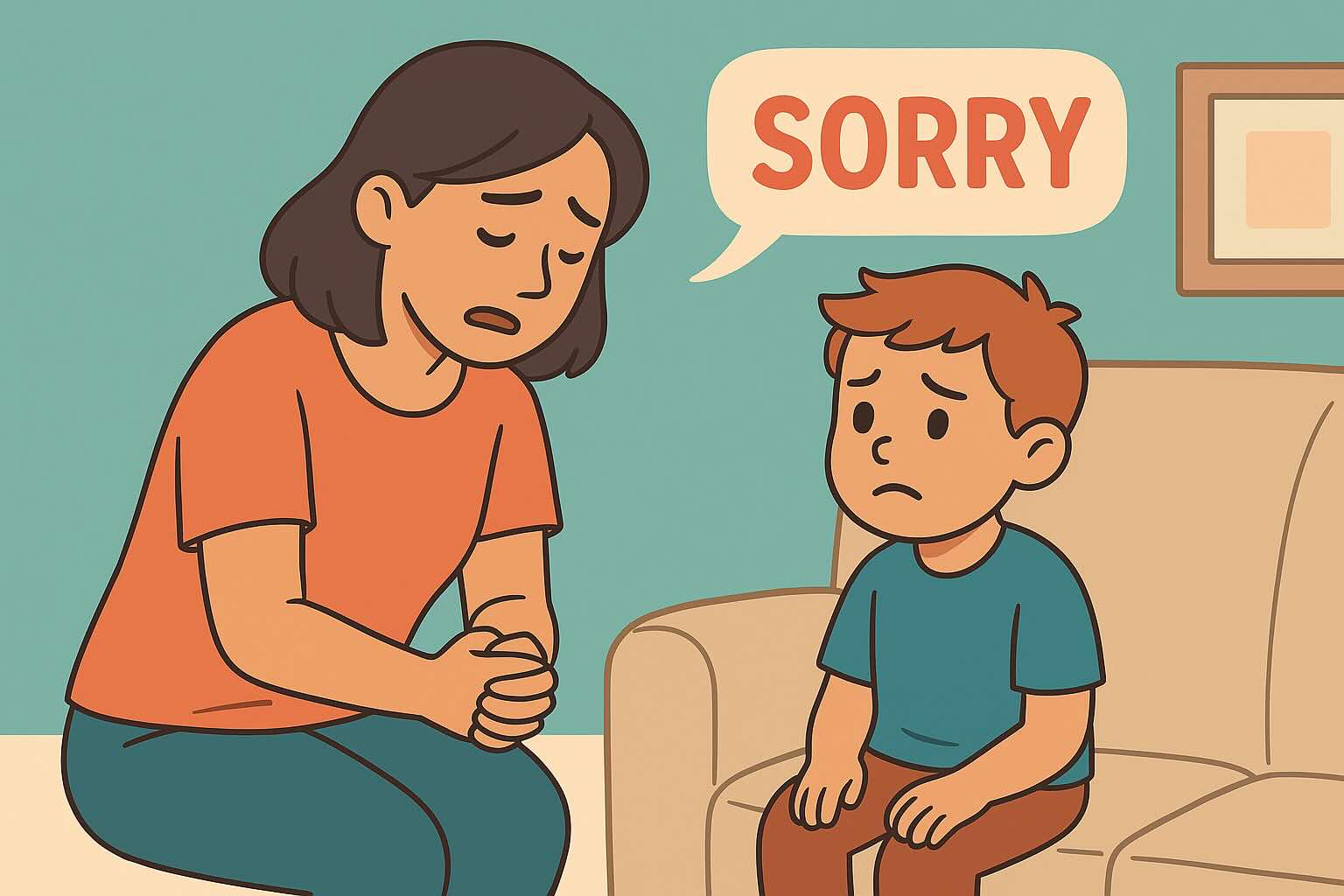
If you're reading this with a heavy heart after a moment you wish you could take back, you're in the right place. Every parent loses their cool sometimes—research shows that 90% of parents report yelling at their children occasionally, and feeling guilty afterward is actually a sign of your commitment to doing better.
This guide provides evidence-based repair strategies that not only heal the immediate hurt but actually strengthen your relationship with your 3-7 year old. You'll learn exactly what to say, when to say it, and how to turn your most challenging parenting moments into opportunities for connection and growth.
For related recovery challenges, also check out our guides on overcoming parent guilt and rebuilding trust after broken promises. You may also find our guides on reconnecting after big fights and recovering from harsh parenting helpful.
What You'll Learn in This Guide
- The Science of Repair - How accountability actually strengthens parent-child bonds
- Perfect Timing - When and how to approach repair conversations with ages 3-7
- Exact Repair Scripts - Word-for-word examples for different scenarios
- Age-Specific Approaches - Tailored strategies for preschoolers vs early elementary
- Prevention Planning - How to identify triggers and prevent future ruptures
- Rebuilding Trust - Long-term strategies for relationship recovery
- Self-Forgiveness - Moving from guilt to growth mindset
Estimated reading time: 12 minutes
Why Repair Matters: The Research on Parent-Child Recovery
The Neuroscience of Rupture and Repair
When you lose your cool with your child, it creates what researchers call a "rupture" in your relationship. But here's what's remarkable: genuine repair actually strengthens neural pathways associated with trust and emotional regulation in your child's developing brain.
Dr. Allan Schore's research shows that children who experience effective repair develop stronger emotional resilience and better self-regulation skills. Your child learns that relationships can weather storms and that mistakes are opportunities for growth, not reasons for shame.
What Happens When We Don't Repair
Without repair, children ages 3-7 often internalize parental outbursts as:
- "I'm bad" (self-blame)
- "Adults can't be trusted" (relationship insecurity)
- "Big feelings are dangerous" (emotional suppression)
- "Mistakes can't be fixed" (learned helplessness)
The Power of Modeling Accountability
When you repair with your child, you're teaching crucial life skills:
- How to take responsibility for mistakes
- That relationships are worth fighting for
- How to manage shame and guilt productively
- That people can change and grow
- How to rebuild trust after hurt
When to Repair: Timing Strategies for Ages 3-7
Immediate Repair (30 minutes - 2 hours later)
Best for:
- Minor irritation or impatience you displayed
- When your child seems ready to reconnect
- Situations where you caught yourself quickly
How to assess readiness: Your child is making eye contact, responding to normal conversation, or showing openness to interaction.
Script example: "Hey sweetie, I want to talk about earlier when I used my grumpy voice with you. That wasn't kind, and I'm sorry. You didn't deserve that."
Next-Day Repair (12-24 hours later)
Best for:
- Bigger ruptures (yelling, harsh words, threats)
- When emotions are still high immediately after
- When your child needs processing time
How to approach: Choose a calm moment, make eye contact, and speak at their physical level.
Script example: "Yesterday when we were getting ready for school, I lost control of my feelings and yelled. That was my mistake, not yours. I want to talk about it."
Ongoing Repair (Multiple conversations)
Best for:
- Patterns of behavior you're working to change
- Situations that deeply affected your child
- When trust needs rebuilding over time
Age-Specific Repair Strategies
Ages 3-4: Simple, Concrete Repair
At this age, keep repairs short, concrete, and emotionally warm.
Key principles:
- Use simple language (5-7 words per sentence)
- Focus on feelings over complex explanations
- Offer physical comfort if welcomed
- Be very concrete about what happened
Effective scripts:
- "I used my loud voice. That felt scary. I'm sorry."
- "My face looked angry. That wasn't about you."
- "I made a mistake. I love you very much."
- "Sometimes grown-ups have big feelings too. I'm learning."
What to avoid:
- Long explanations about your stress
- Complex reasoning about behavior
- Making them comfort you
- Rushing to consequences or lessons
Ages 5-7: More Complex Understanding
Children this age can understand more nuanced emotional concepts and cause-and-effect relationships.
Key principles:
- Acknowledge their emotional experience
- Explain without excusing your behavior
- Involve them in problem-solving when appropriate
- Validate their right to feel upset
Effective scripts:
- "I yelled this morning, and I can see that felt scary for you. You didn't do anything wrong."
- "I was feeling overwhelmed with getting everyone ready, AND that doesn't make yelling okay."
- "I made a choice to use harsh words. That was my mistake, and I want to do better."
- "You have every right to feel upset with me about how I acted."
The Complete Repair Process: 6 Essential Steps
Step 1: Take Full Responsibility (No "But" Statements)
Do this:
- "I made a mistake when I yelled at you."
- "I lost control of my emotions, and that wasn't okay."
- "I chose to use harsh words, and I regret that choice."
Avoid this:
- "I'm sorry I yelled, but you weren't listening."
- "I wouldn't have gotten angry if you had just..."
- "I'm sorry you felt bad when I..."
Step 2: Acknowledge Their Experience
For ages 3-4:
- "That felt scary when I used my loud voice."
- "You looked worried when I got angry."
- "My angry face wasn't kind to you."
For ages 5-7:
- "I can imagine that felt frightening when I raised my voice."
- "You might be feeling confused or upset about what happened."
- "It probably didn't feel safe when I lost my temper."
Step 3: Validate Their Feelings
Essential phrases:
- "Your feelings about this are important."
- "It's okay to feel upset with me."
- "You have every right to feel however you feel."
- "I understand if you're still feeling hurt."
Step 4: Explain Without Excusing (Ages 5-7)
Structure: Responsibility + Context + Boundary
- "I was wrong to yell" + "I was feeling stressed about being late" + "AND that doesn't make yelling okay."
- "I shouldn't have used harsh words" + "I was tired from work" + "AND being tired isn't an excuse."
Step 5: Share Your Growth Plan
For younger children (3-4):
- "I'm going to practice using my calm voice."
- "Next time I'll take deep breaths first."
- "I'm learning to be a better mom/dad."
For older children (5-7):
- "I'm working on recognizing when I feel overwhelmed before I lose my temper."
- "I want to learn better ways to handle my big feelings."
- "I'm going to practice taking breaks when I feel stress building up."
Step 6: Reconnect (When They're Ready)
Let them lead:
- "Would you like a hug, or do you need more space?"
- "Is there anything you want to tell me about what happened?"
- "How are you feeling right now?"
Don't force forgiveness:
- "You don't have to say 'it's okay' - what I did wasn't okay."
- "Take all the time you need to feel ready to connect again."
Repair Scripts for Common Scenarios
After Yelling During Morning Rush
For ages 3-4: "This morning I used my very loud voice when we were getting ready. That felt scary. I was worried about being late, AND that doesn't make loud voices okay. I'm sorry. You're a good kid, and I love you."
For ages 5-7: "I want to talk about this morning when I yelled while we were getting ready. I was feeling stressed about time, and I took that stress out on you. That was wrong. You were just being a normal kid, and you didn't deserve to be yelled at. I'm working on managing my morning stress better."
After Threatening a Consequence in Anger
For ages 3-4: "Earlier I said something about throwing away your toys when I was angry. That was mean. I don't throw away your things. I was feeling frustrated, and I said something hurtful. I'm sorry."
For ages 5-7: "I need to apologize for threatening to throw away your toys earlier. I was angry and said something I didn't mean to try to control your behavior. That was wrong and probably felt scary. I don't actually throw away your belongings, and I shouldn't threaten things I don't mean."
After Shaming or Name-Calling
For ages 3-4: "I called you a name when I was angry. That was mean. You are not a bad kid. You are good and I love you. I'm sorry I said hurtful words."
For ages 5-7: "I called you [specific words] when I was frustrated, and that was completely wrong. Those words were hurtful and unfair. You're not any of those things - you're a good kid who was having a hard moment. I let my anger control my words, and I'm very sorry."
After Being Dismissive or Impatient
For ages 3-4: "When you were trying to tell me something, I didn't listen with kind eyes. That wasn't nice. Your words are important. I'm sorry."
For ages 5-7: "Earlier when you were trying to talk to me, I was impatient and didn't give you my attention. I can see that felt hurtful. What you have to say matters to me, and I should have listened better. I'm sorry for making you feel unimportant."
Rebuilding Trust: Long-Term Repair Strategies
Create Prevention Plans Together (Ages 5-7)
Involve your child in problem-solving:
- "What could help me remember to use my calm voice in the mornings?"
- "If you notice I'm getting overwhelmed, what should we do?"
- "How can we make transitions easier for our whole family?"
Establish Repair Rituals
Daily connection practices:
- Regular one-on-one time for emotional check-ins
- Bedtime conversations about daily highlights and struggles
- Weekly family meetings to address patterns and solutions
- Special repair activities (reading together, taking a walk, having hot chocolate)
Track Your Growth Together
For ages 5-7, consider:
- Using a simple chart to track calm responses vs. reactive ones
- Celebrating improvements together
- Letting your child help you notice early warning signs
- Creating family "calm down" strategies
When Repair Doesn't Go as Planned
If Your Child Rejects Your Apology
Remember:
- They have every right to their feelings
- Forgiveness can't be forced or rushed
- Your job is to repair, not to feel better immediately
What to say:
- "I understand you're still upset with me. That's okay."
- "You don't have to forgive me right now."
- "I'm here when you're ready to talk more."
- "My apology isn't going away, even if you're not ready to hear it yet."
If You Keep Making the Same Mistakes
Acknowledge the pattern honestly: "I notice I keep struggling with [specific trigger]. I'm working on this, and I understand it's frustrating for you too. Here's what I'm doing to change..."
Get support:
- Consider counseling for anger management
- Join parent support groups
- Work with a family therapist
- Address underlying stress, depression, or anxiety
If Trust Feels Broken
Remember:
- Repair is a process, not a single conversation
- Children are naturally forgiving when they feel safe
- Consistency in your efforts matters more than perfection
- Professional support can help with significant ruptures
Self-Forgiveness: Moving from Guilt to Growth
Understanding Parent Guilt vs. Shame
Guilt (helpful): "I did something wrong and want to make it right." Shame (harmful): "I am a bad parent and can't change."
Guilt motivates repair and growth. Shame keeps you stuck.
The Growth Mindset Approach to Parenting Mistakes
Instead of: "I'm a terrible parent." Try: "I'm learning to parent better."
Instead of: "I've ruined my child." Try: "This is an opportunity to teach repair and resilience."
Instead of: "I should never lose my temper." Try: "I'm human and I'm working on emotional regulation, just like my child."
Creating Your Personal Repair Practice
Daily reflection questions:
- What triggered my reactivity today?
- How did I handle repair with my child?
- What can I do differently tomorrow?
- What support do I need to be the parent I want to be?
Weekly assessment:
- Are my repairs becoming more effective?
- What patterns am I noticing in my triggers?
- How is my relationship with my child feeling overall?
- What growth am I seeing in myself and my child?
Your 4-Week Repair Mastery Plan
Week 1: Awareness Building
- Notice your triggers without judgment
- Practice immediate self-regulation techniques
- Begin using basic repair language
- Track patterns in a simple journal
Week 2: Refine Your Repair Skills
- Use age-appropriate repair scripts
- Focus on timing your repairs effectively
- Practice validating your child's experience
- Avoid "but" statements in apologies
Week 3: Prevention and Planning
- Identify your top 3 triggers
- Create specific prevention strategies
- Involve your child in problem-solving (ages 5-7)
- Establish regular check-in times
Week 4: Long-Term Integration
- Build repair into your family culture
- Celebrate growth and improvements
- Address any ongoing trust issues
- Plan for continued growth and learning
The Long-Term Benefits of Repair Culture
For your child:
- Stronger emotional regulation skills
- Better relationship abilities throughout life
- Resilience in facing challenges and conflicts
- Understanding that mistakes don't define us
- Healthy models for accountability and growth
For your family:
- Increased trust and emotional safety
- Better communication during conflicts
- Reduced shame and blame dynamics
- More authentic, connected relationships
- A culture of growth rather than perfection
Key Takeaways: Your Repair Roadmap
- ✅ Repair strengthens relationships when done genuinely and consistently
- ✅ Timing matters - wait for emotional regulation but don't wait too long
- ✅ Take full responsibility without "but" statements or excuses
- ✅ Acknowledge your child's experience and validate their feelings
- ✅ Age-appropriate approaches work better than one-size-fits-all scripts
- ✅ Prevention planning reduces future ruptures and builds partnership
- ✅ Self-forgiveness is essential for sustainable change
- ✅ Professional support is available when patterns persist
- ✅ Repair is a skill that improves with practice and intention
Remember: You're not trying to be a perfect parent - you're modeling how imperfect humans can love each other well, make mistakes, and grow together.
This article is based on attachment theory, developmental psychology research, and clinical practices in family therapy. Individual family dynamics vary, and persistent patterns may benefit from professional support. Always trust your instincts about your child's emotional needs and seek guidance when needed.
24/7 AI Parenting Assistant
Get instant, personalized advice with expert-curated parenting knowledge. Chat with your AI coach anytime, anywhere.
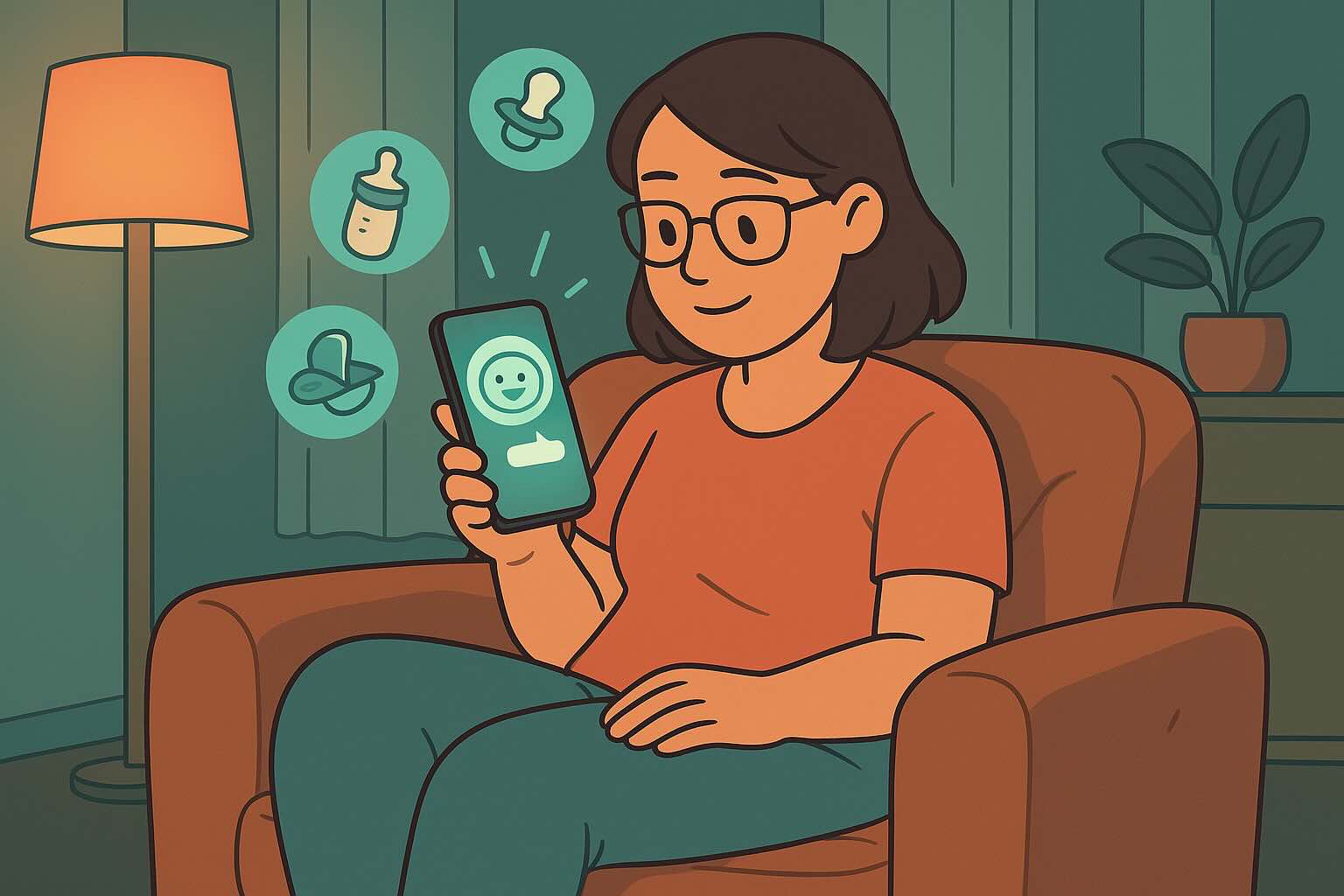
Parent Repair Scripts
Word-for-word scripts for rebuilding trust and modeling accountability after losing your cool with your child.
Frequently Asked Questions
Need personalized support?
RootWise's AI coach can provide tailored strategies for your specific situation, available 24/7 when you need it most.
Learn More About AI Coaching →